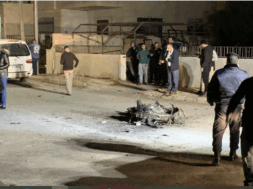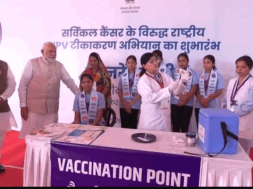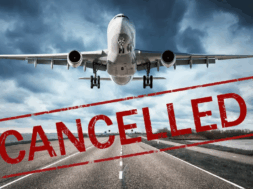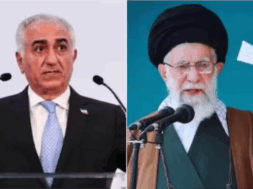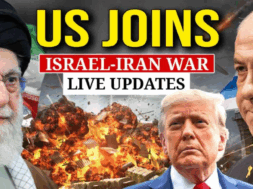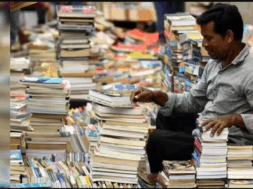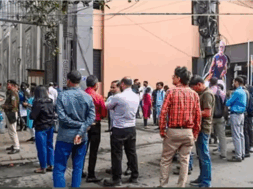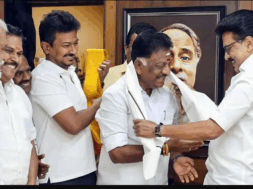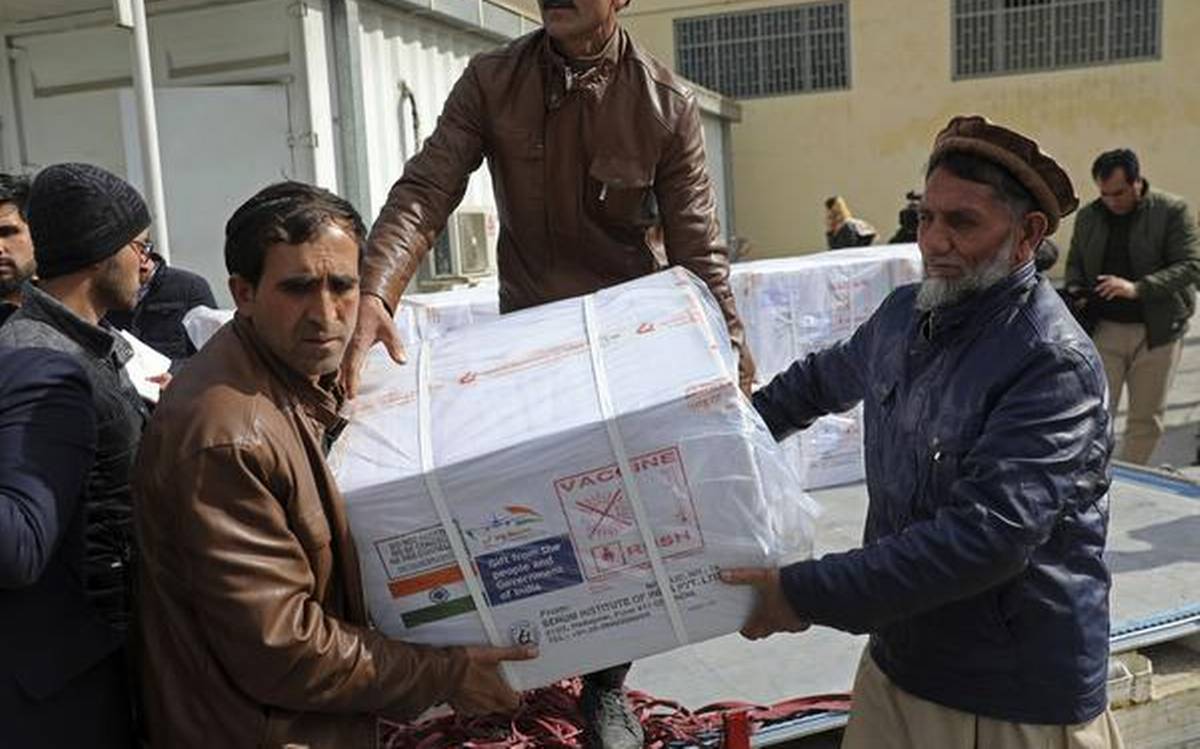
Protests against Arrests for Questioning Modi Government’s Vaccine Export Policy
Manas Dasgupta
NEW DELHI, May 16: The arrest of 24 persons in Delhi for questioning the government’s vaccine export policy has generated nation-wide protests from the Congress and other opposition party leaders.
“Smacks of a lawless state gone amuck,” the Congress Rajya Sabha MP and noted Supreme Court lawyer Abhishek Manu Singhvi remarked while questioning the government under what law they were arrested. The former union home and finance minister P Chidambaram quipped, “There is freedom of speech in India, except when you question the Narendra Modi government.”
Challenging the arrests by the Delhi police for posters that surfaced across the city questioning the Prime Minister’s decision to donate vaccines to neighbouring countries, former Congress president Rahul Gandhi posted the ‘offending’ poster on his Twitter account daring the police to arrest him.
All the posters uniformly pose the question: “Modiji humare bachon ka vaccine videsh kyon bhej diya?” (Why did you send vaccines meant for our children abroad?). Gandhi said, “Arrest me too.”
Nearly six crore doses of vaccines have been sent out to various countries. So far, a little over four crore persons have got both doses in India and 14 crore people have got a single dose as per the latest numbers on the centralised vaccination website CoWin.
The persons were arrested under a rarely used law of “Prevention of Defacement of Property Act” and most of them have been released on bail. “Celebrate, India is a free country. There is freedom of speech, except, when you ask a question of the Honourable Prime Minister,” Chidambaram wrote on Twitter. He said the poster asks a simple question and before Modi could answer the Delhi police had answered with arrest.
Congress Chief Whip in the Rajya Sabha Jairam Ramesh pasted the poster next to his nameplate at his official residence opposite the Lodhi Garden.
“I am shocked and stunned. May vehemently disagree but under what authority, what law, what power can you arrest those who put up posters,” Abhishek Manu Singhvi said. He said this “smacks of a lawless state gone amuck.”
Later at a press conference, Congress spokesperson Pawan Khera said who else does one pose the question to if not the government. The vaccine policy was centralised. It was the Union government that held the initial negotiations with the manufacturers, he said. And it was also their decision when they believed that India had already won its war against COVID to cart off the vaccines to other nations. “Narendra Modi wanted to be known as the vaccine guru of the world. So it is obvious that only one person — Mr. Modi — alone can answer these questions.”
He said the vaccine policy was kept centralised till the situation was in control. As soon as it went out of hand, the Centre handed over the power to the States to negotiate on their own with the manufacturers. “You can’t have centralised decision making and decentralised responsibility.” The vaccine diplomacy was all for building Modi’s image alone, he alleged.
The CPI(M) general secretary Sitaram Yechury pointed out that the vaccination drive has slowed down. “As the pandemic surges relentlessly claiming countless lives, vaccination drive is in shambles. Since mid-April vaccination dropped significantly. May 14 saw 18.7 lakh compared to 34.7 lakh on April 14. Start free universal mass vaccination now,” Yechury who recently lost his elder son to Covid, tweeted.
Strangely, a government that stoutly defended its vaccine export policy in the Supreme Court and its external affairs minister S Jaishankar commenting, “only irresponsible people are questioning the government’s vaccine export policy,” went defensive when acute shortage of vaccine became an issue amidst continuous surge in the Corona cases in the country.
The BJP apparently is now trying to disown their own campaign of “vaccine diplomacy.” The party spokesperson Sambit Patra recently claimed that only one crore doses out of the six went as an aid for the neighbouring countries; the remaining were part of “contractual obligations” of the two manufacturers — Bharat Biotech and Serum Institute of India with other countries, about which the government could not have done anything.
The question had been raised that if Patra was right how the government directed the SII to stop its obligations to export more vaccine doses to the United Kingdom at this stage. Reports have also circulating in the media that the government was now planning to ban vaccine exports from the country.
The “entire globe is a unit during a pandemic” was how the government had justified in the Supreme Court its decision to export vaccines amidst a surge in the second wave. The Ministry of External Affairs’ website shows that between January and April 2021, India exported 663.698 lakh “Made in India Vaccines” to over 90 countries and UN health workers and peacekeepers.
“Once an epidemic takes (the) form of a pandemic, its management has to be done keeping the entire globe as (a) unit,” a March 11 affidavit of the Health Ministry informed the apex court. The document sheds further light into the much criticised-move to export COVID-19 vaccines.
In fact, according to the affidavit, the government reasoned it was not possible to take a country or States-specific approach. The government envisaged vaccine export as part of a “global action to vaccination”. The Centre reasoned that it was necessary to protect the high-risk population in other countries to “break the chain of transmission” and “minimise chances of import of COVID-19 cases to India”.
The government justified that India was “not immune to the pandemic till the world at large has contained the disease,”
It said the export was “limited” and done giving “highest priority to domestic needs.”
But this is not all. The government, in the affidavit, gives another “dimension” to why it exported vaccines and opted for staggered immunisation.
It said both were done to avoid disproportionality between the production of COVID-19 vaccines and the country’s “available” health infrastructure and manpower. Simultaneous vaccination without priority classification would have led to “commotion,” the Centre told the Supreme Court.
The affidavit highlights the need for “adequate manpower” and “sufficient infrastructure” to “cope” with the immunisation drive. The document indicates that the available health infrastructure and manpower may not match up.
“To illustrate, having received one crore vaccine doses for a particular State or city, the vaccine drive would need sufficient number of medical staff who can administer the vaccines and infrastructure like hospitals, primary health centres, etc… It is needless to mention that manufacturing of vaccine would not be proportionate to the available manpower and infrastructure facilities in the country,” the government justified.
Even if such infrastructure was available, the Centre said, “simultaneous vaccine without priority classification would lead to commotion.”
“Under the circumstances, the produced vaccine, which is beyond manpower and infrastructure facilities available, is exported,” the government explained.
The government apparently contradicted its own justified stand about matching the vaccine supply with available infrastructure by taking a sudden decision about universal vaccination for all above the age of 18 without either boosting the vaccine production or strengthening the health infrastructure that was causing a chaotic situation in the vaccination drive. The centre’s half-baked measures in controlling and then partially de-controlling the vaccination drive holding the states responsible for its success had only added woes to the people looking for vaccines to protect themselves against the pandemic.
A West Bengal government affidavit in the top court, filed a month after the Centre’s March 11 one, gives a different picture of the vaccination campaign.
“Currently, only 1.54 percent of the Indian population has been fully vaccinated and only around 8.4 percent of the population has received one dose of the vaccine,” West Bengal told the Supreme Court on April 29. Interestingly, the state then was under the charge of the Election Commission of India.
It said if India wanted to cover at least 80% of its eligible population above 18 years of age by the end of this year, then it must increase its vaccination rate by about 100 million doses/month.
“At the current rate of vaccination, which is about 2.2 million doses administered per day, only 30 percent of the eligible population will be vaccinated fully by the end of this year. Therefore, the immediate singular objective of the Government of India ought to be to take drastic steps to achieve universal coverage at the earliest,” the West Bengal government said.
Terming vaccine as a “public good”, West Bengal said even “a single person deprived of vaccination would be to the collective detriment of a large section of society.”
